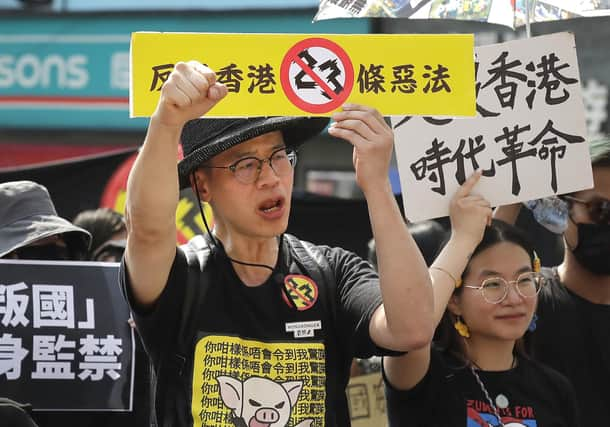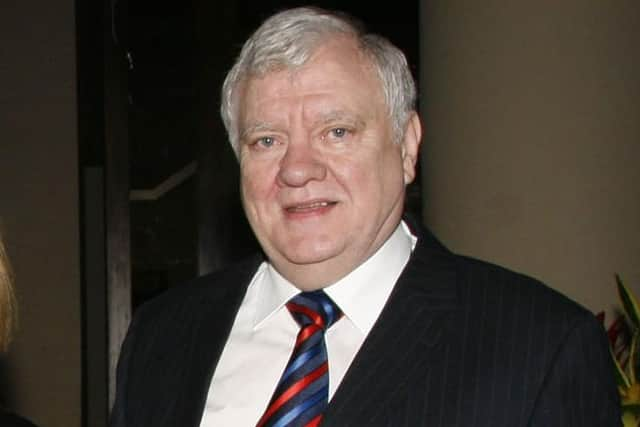John Cushnahan: China has ended the right to free speech and protest in Hong Kong and destroyed the settlement for the city


It established the ‘one country, two systems’ which set out in detail how Hong Kong would be governed after it was handed back to China by the United Kingdom in 1997.
Under this unique agreement, a mini-constitution called the Basic Law was supposed to protect the city's autonomy. The Basic Law was also intended to protect certain freedoms for Hong Kong including freedom of assembly and speech, an independent judiciary and some democratic rights – freedoms that no other part of mainland China has.
Advertisement
Hide AdAdvertisement
Hide AdHoping to build on this, pro-democracy activists in 2014 campaigned for the introduction of universal suffrage to elect the Chief Executive who was the Head of Government of the Hong Kong Special Administrative Region (HKSAR). Primarily led by students, they held many demonstrations and were known as the ‘Umbrella Movement’. They earned this name because they used umbrellas to repel the pepper sprays and the CS gas which was used against them. At the time, solidarity demonstrations were held in other parts of the world to support them particularly outside Chinese embassies. The demonstrations eventually waned and three of their leaders were jailed.


However, they were to re-emerge when the pro- Beijing Hong Kong Government (LegCo) introduced an extradition Bill in 2019. Pro- democracy activists feared this would be used to extradite them to the Chinese mainland and tried in courts which they believed (with justification) simply followed the orders of the Chinese Communist Party. The extradition protests also became fused with demands once again for the introduction of universal suffrage and the establishment of a democratically elected Hong Kong Legislative Council.
Many large pro-democracy demonstrations took place and on one occasion there were 500,000 demonstrators. Alarmed by this, in July 2020, China adopted a new controversial National Security Law in relation to Hong Kong which had far-reaching implications. They targeted Hong Kong’s pro-democracy movement with severe penalties, including possible life sentences. These laws, overrode Hong Kong laws and judicial independence, effectively ending Hong Kong’s autonomy. Freedom of speech, human rights, and the right to political dissent were the casualties.
Under this law just under 300 pro-democracy supporters were arrested and 79 brought before the courts including media tycoon 76-year-old Jimmy Lai whose newspaper Apple Daily which was critical of Chinas political leadership was closed down along with many other independent news outlets. Many of these trials are still continuing.
Advertisement
Hide AdAdvertisement
Hide AdWhen this National Security Law was introduced, many critics of it, including myself, publicly stated that it marked the beginning of the end of the ‘one country two systems’.
If there was any doubt about the accuracy of such an assessment, it is no longer in doubt given what China has done in the last few days. Last Saturday its puppet regime in Hong Kong introduced new laws under ‘Article 23’ which in effect, in my opinion have effectively destroyed the credibility of what was supposed to be the ‘one country, two systems’.
At the same time as the world’s super-powers are preoccupied and distracted by conflicts in Ukraine and the Middle East, it would seem that its timing of introducing these draconian new laws has been very opportunistic.
They include life imprisonment for endangering national security, treason and insurrection, 20 years for espionage and sabotage and 14 years for external interference.
Advertisement
Hide AdAdvertisement
Hide AdFurthermore, they also include an offence of inciting hatred against China’s Communist party leadership which, if convicted could result in a sentence of up to 10 years.
Had these already existed, thousands of pro-democracy activists would already have been before the courts.
In an even more frightening development, the Hong Kong Chief Executive has been given the power to create new offences enabling his security minister to impose sentences on activists who live overseas (this could include non-nationals if they were visiting Hong Kong or China?). Police powers will also be extended to detain people for up to 16 days and also restrict them from meeting with lawyers or communicating with anyone else.
The wider international community must take action. Moral condemnations of China’s action alone will not change Chinese policy. Institutions like the EU must give priority to the defence of human rights over their selfish trading interests with China.
Advertisement
Hide AdAdvertisement
Hide AdChina’s current arrogance stems from their rapid emergence as a global economic power en route to being the world’s largest in the next couple of decades. The only thing that will halt China’s aggression in the South China Sea region is when the international community including EU governments work together to do two things
Firstly, to impose financial and trade sanctions that threaten to undermine China’s role as a global economic power.
Secondly, by creating military coalitions such as an expanded ‘Asian Nato’ as suggested by the United States Asia Tsar, Kurt Campbell. It could involve EU members of Nato and would provide a military counterweight to China.
If the international community fails to act against China’s latest actions, China’s next target will be Taiwan and that would create an even more frightening world security scenario than what exists at present.
• John Cushnahan is a former leader of the Alliance Party and Fine Gael MEP. He was European Parliament Rapporteur on Hong Kong from 1997 to 2024.